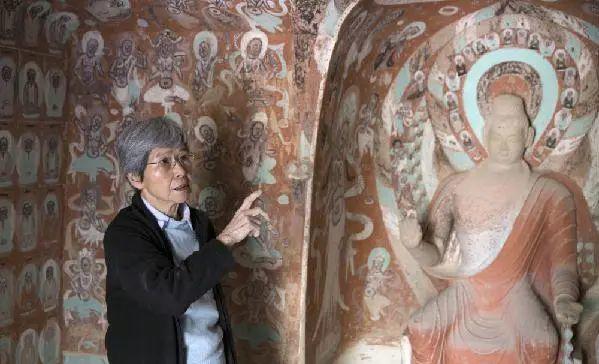morality
paradigm
Remember the national moral model Fan Jinshi

Fan Jinshi in the Mogao Grottoes in Dunhuang
The 83-year-old Fan Jinshi has received a heavy honor - a national moral model. Her life was simple and indifferent to fame and fortune, and she returned all the medals, awards, and bonuses she received over the years. "This is not my personal honor, but it belongs to the Dunhuang Research Institute for generations."
Over the years since her retirement, Fan Jinshi still spends most of her time in Dunhuang every year. The second volume of the Complete Collection of Dunhuang Grottoes, which took more than 10 years to compile and more than 300,000 words, "Archaeological Report on Caves 256-259 of Mogao Grottoes", is the most worrying thing for this archaeologist who graduated from Peking University more than half a century ago.
"Dean Fan's greatest concern is the archaeological report. She always said that archaeological reports are very important, we must calm down and do it, and we must be worthy of conscience. Wang Jiao, a librarian at the Institute of Archaeology of the Dunhuang Research Institute, who participated in the preparation of the archaeological report with Fan Jinshi, said.
In 1963, Fan Jinshi graduated from university and came to Dunhuang in the gobi desert. "When I first stayed, I had feelings for the Mogao Grottoes. The Silk Road gave birth to Dunhuang, and on this oasis irrigated by snow and water in the Qilian Mountains, Chinese and Western civilizations exchanged. The wisdom and creation of the ancients have left us a great treasure house of culture and art, the Mogao Grottoes. Fan Jinshi said.
Living in an earthen house, sleeping on a clay kang, lighting an oil lamp, drinking salt water, the barren Gobi did not scare away the Beijing-born girl who grew up in Shanghai. The husband and wife have been separated for many years, the children are fostered in the countryside, and the difficulties and worries of life have not allowed her to leave.
"Dunhuang's materials are incomparably vast, the content is infinitely rich, and the work is overwhelming." After coming to Dunhuang, Fan Jinshi participated in the excavation and cleaning work of the cave front site in the southern district of mogao caves and the Han tomb in Dunhuang Qili Town. Using the method of archaeological typology, she completed the periodization of the Dunhuang Mogao Grottoes in the Northern Dynasty, Sui And Early Tang Dynasty, which became the result of the staging of dunhuang grottoes recognized by the academic community.
From 1985 to 1986, Fan Jinshi took the lead in the application for the Mogao Grottoes. "The application for the heritage has given me great stimulation, and the world cultural heritage is really a wonderful thing!" I learned that the international conventions and charters on cultural heritage, the concept of cultural heritage integrity and authenticity, the relationship between cultural relics protection and tourism openness, cultural relics protection and law, etc. ”
Fan Jinshi said that this incident prompted her to no longer be limited to the world of archaeology, but to begin to learn law, management and other knowledge and various policies in practice, and to make up her mind to "manage the legacy left by her ancestors well."
One of her major contributions is to use digital methods to "manage" the Mogao Grottoes that have stood in the wind and sand for a thousand years. "Compared to the photographs taken at the beginning of the 20th century, many of the murals have been damaged and blurred. What if we go any further down and all of them disappear? At the end of the 1980s, out of this concern, Fan Jinshi actively explored exchanges and cooperation with domestic and foreign institutions, and spent 20 years to make a high-fidelity Dunhuang Grottoes digital archive.
Under her initiative, dunhuang research institute innovated the tourism open model, took the lead in carrying out research on tourist carrying capacity in China's cultural heritage sites, and used the digital archives of Dunhuang grottoes to build the Mogao Grottoes Digital Display Center. Visitors first watch a digital movie to understand the past and present lives of mogao grottoes, and then go to the caves to appreciate the wisdom and wisdom left by the ancients thousands of years ago.
"We promote responsible tourism, responsible for cultural relics, and responsible for tourists." She said.
Fan Jinshi stepped down as the president of the Dunhuang Research Institute, and after withdrawing from the heavy management work, she returned to the archaeology industry and then did the "should do" - archaeological report.
"Dean Fan has the spirit of doing research to the end. She collects a large amount of information at home and abroad, and after a very detailed comparative study, she will put forward her own conclusions. But she never considers herself 'authoritative', discusses with us, listens to our opinions, and always thinks about cultivating young people and considering the development of young people. Wang Jiao said.
In the eyes of Fan Jinshi, who calls himself "post-80s", generations of people in the Gobi Desert insist on relay, and all they have to do is two things: one is to accompany the Mogao Grottoes, and the other is to constantly explore and advance.
"I believe things are done stick after stick. I did this part of mine and now I can do a little bit is a little. I look forward to and believe that young people will do better, inherit the 'Mogao spirit' and make new and greater contributions to the cultural heritage of mankind." Fan Jinshi said.
END
Edit | Xu Rong
Source | Xinhua